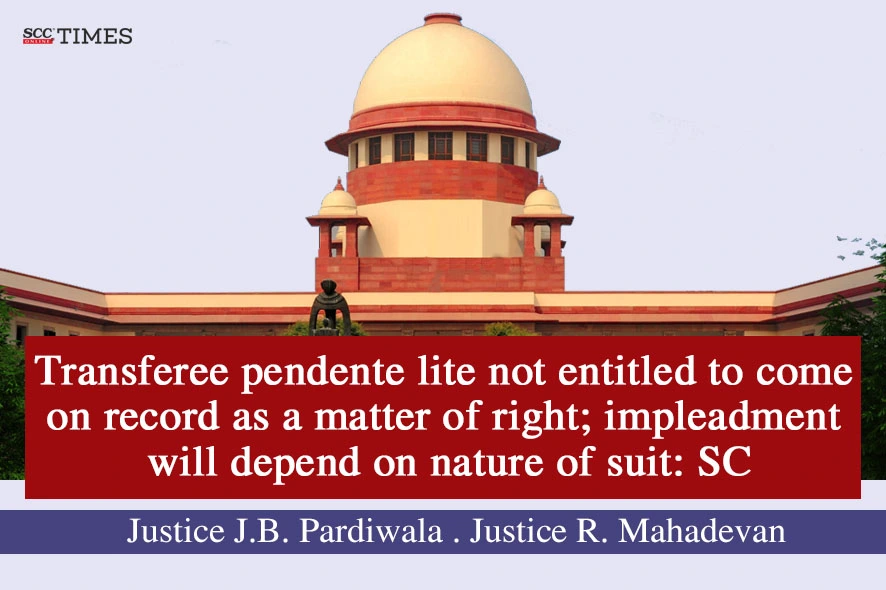Supreme Court: While considering the instant appeals dealing with issues of condonation of delay and specific performance of contract, the Division Bench of J.B. Pardiwala* and R. Mahadevan, JJ., held that for the purpose of impleading a transferee pendente lite, the facts and circumstances should be gone into and basing on the necessary facts, the Court can permit such a party to come on record, either under Order I Rule 10 CPC or under Order XXII Rule 10 CPC, as a general principle. The Court further held that transferee pendente lite is not entitled to come on record as a matter of right; and there is no absolute rule that such a transferee pendente lite, with the leave of the Court should, in all cases, be allowed to come on record as a party. Furthermore, the impleadment of a transferee pendente lite would depend upon the nature of the suit and appreciation of the material available on record.
Background and Contentions:
The instant appeals challenged the decision of Karnataka High Court condoning delay of 586 days in filing the said appeal against the judgment and decree dated 16-09-2016 passed by the Senior Civil Judge and JMFC, Devanahalli in Original Suit instituted for specific performance of contract.
Counsel for the appellants contended that High Court committed a serious error in condoning the unexplained and inordinate delay of 586 days in preferring the regular first appeal and also by granting leave to file appeal to the Respondents 1 and 2 i.e., subsequent purchasers of the suit property. It was argued that having purchased the suit property pendente lite on 05-04-2004 and that too in contravention of the order of temporary injunction dated 17-12-2003 passed by the Trial Court, the Respondents1 and 2 respectively did not deserve any indulgence. It was argued that the Respondents 1 and 2 cannot be said to be bona fide purchasers of the suit property for value without notice.
Per contra, the respondents argued that Respondents 1 and 2 are bona fide subsequent purchasers of the suit property and as subsequent purchasers, they have a substantial interest in the suit property and also in the final outcome of the suit. It was further argued that Respondents 1 and 2 both of whom are senior citizens, were residing with their children in Scotland when their application for impleadment was rejected by the Trial Court and were assured by the vendor (original owner) that he would defend their interest in the suit and therefore due to the trust and faith reposed in him; they did not make any efforts to prosecute the suit or the Appeal. It was then submitted that the lis pendens purchasers although not arrayed as parties in the suit, yet they are the persons who could be said to be claiming as defendants under Section 146 of the Code of Civil Procedure, 1908.
Court’s Assessment:
Perusing the impugned order of the High Court, the Court observed that what weighed with the High Court was the fact that the Respondents 1 and 2 respectively are aged 75 and 66 years and are living with their children in Scotland. The High Court proceeded further to observe that the Respondents 1 and 2 have purchased 4 acres of land out of a large chunk of subject property and their vendor i.e. the original owner failed to protect their interest in the suit proceedings.
The Supreme Court opined that the High Court committed an egregious error in condoning delay of 586 days in filing the regular first appeal on mere asking.
Thereafter, the Court proceeded to explain the law governing the grant of leave to appeal. The Court said that Sections 96 and 100 respectively of the Code of Civil Procedure, 1908 (CPC) provide for preferring an appeal from any original decree or from decree in appeal respectively. The aforesaid provisions do not enumerate the categories of persons who can file an appeal. However, it is a settled legal proposition that a stranger cannot be permitted to file an appeal in any proceedings unless he satisfies the court that he falls within the category of aggrieved persons. It is only where a judgment and decree prejudicially affects a person who is not a party to the proceedings, he can prefer an appeal with the leave of the Appellate Court. A party to a suit adversely affected by a decree or any of his representatives-in-interest may file an appeal. But a person who is not a party to a decree or order may, with the leave of the court, prefer an appeal from such decree or order if he is either bound by a decree or order or is aggrieved by it or is otherwise prejudicially affected by it. The Court further explained that the expression “person aggrieved” does not include a person who suffers from a psychological or an imaginary injury.
It was stated that it would be improper to grant leave to appeal to every person who may in some remote or indirect way be prejudicially affected by a decree or judgment. Ordinarily leave to appeal should be granted to persons who, though not parties to the proceedings, would be bound by the decree or judgment in that proceeding and who would be precluded from attacking its correctness in other proceedings.
Examining Section 52 of Transfer of Property Act, 1882, the Court said that a lis pendens transferee from the defendant, though not arrayed as a party in the suit, is still a person claiming under the defendant. The same principle of law is recognized in a different perspective by Rule 16 of Order XXI of the CPC which speaks of transfer or assignment inter vivos or by operation of law made by the plaintiff-decree-holder.
The transferee may apply for execution of the decree of the Court and the decree will be available for execution in the same manner and subject to the same conditions as if the application were made by the decree-holder. It is relevant to note that a provision like Section 146 of the CPC was not be found in the preceding Code of Civil Procedure, 1859 and was for the first time incorporated in the CPC. In Order XXI Rule 16 also an explanation was inserted through amendment made by Act No. 104 of 1976 w.e.f. 01-02-1977 whereby the operation of Section 146 CPC was allowed to prevail independent of Order XXI Rule 16 CPC.
The Court explained that the scope of Order I Rule 10 and Order XXII Rule 10 CPC is similar. Therefore, the principles applicable to Order XXII Rule 10 CPC, in order to bring a purchaser pendente lite on record, are applicable to Order I Rule 10 CPC. Thus, a lis pendens transferee though not brought on record under Order XXII Rule 10 CPC, is entitled to seek leave to appeal against the final decree passed against this transferor, the defendant in the suit. However, whether to grant such leave or not is within the discretion of the court and such discretion should be exercised judiciously in the facts and circumstances of each case.
Where a transferee pendente lite does not ask for leave to come on record, that would obviously be at his peril, and the suit may be improperly conducted by the plaintiff on record. “Merely because such transferee pendente lite does not come on record, the concept of him (transferee pendente lite) not being bound by the judgment does not arise and consequently he would be bound by the result of the litigation, though he remains unrepresented”.
Perusing the facts of the case, the Court pointed out that the application filed by the Respondents 1 and 2 respectively under Order I Rule 10 CPC for being impleaded as party to the suit was rejected by the Trial Court. The said order was not challenged. Based the relevant precedents referred by the Court, it was concluded that rejection of the application filed under Order I Rule 10 CPC is per se not a ground to reject the application for leave to file appeal. The Appellate Court has to see whether the transferee pendente lite is aggrieved by a decree or is otherwise prejudicially affected by it. The Appellate Court has to examine that if the decree is allowed to stand, the same will operate res judicata.
Having regard to the fact that the Respondent Nos. 1 and 2 respectively purchased the suit property during the pendency of the suit instituted for specific performance and that too, while the injunction against the original owner (transferor) was operating, the Respondent Nos. 1 and 2 respectively could not be said to have even made out any good case for grant of leave to appeal.
With the afore-stated assessment, the Court set aside the impugned order and said that Respondents 1 & 2 feel that they have been duped or cheated by the vendor, then it shall be open for them to avail appropriate legal remedy before the appropriate forum in accordance with law for the purpose of recovery of the amount towards sale consideration paid at the time of execution of the sale deed.
CASE DETAILS
|
Citation: Appellants : Respondents : |
Advocates who appeared in this case For Petitioner(s): For Respondent(s): |
CORAM :









Very good Judgement